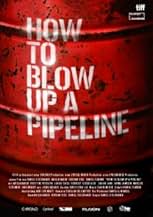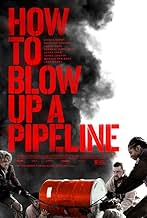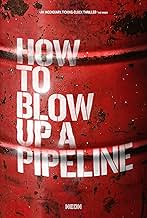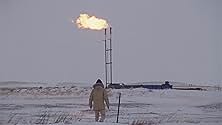NOTE IMDb
6,9/10
12 k
MA NOTE
Une bande de défenseurs de l'environnement élabore un plan audacieux pour perturber le fonctionnement d'un oléoduc.Une bande de défenseurs de l'environnement élabore un plan audacieux pour perturber le fonctionnement d'un oléoduc.Une bande de défenseurs de l'environnement élabore un plan audacieux pour perturber le fonctionnement d'un oléoduc.
- Réalisation
- Scénario
- Casting principal
- Récompenses
- 5 victoires et 16 nominations au total
Avis à la une
When I read about "How to Blow Up a Pipeline", I just had to see this movie. It is a timely political thriller that follows a group of eco-saboteurs who target an oil pipeline. Led by Xochitl, played by Ariela Barer, the group includes a diverse mix of characters, each with their own reasons for taking drastic action against the things that are killing the planet. The movie intercuts between their operation in Texas and flashbacks that reveal each character's motivations. We follow the group's nerve-wracking operation in Texas, where they check out their target, rig up explosives, and then set about doing the deed. Despite its political leanings, the movie doesn't preach or glamorize its characters, and the actors deliver strong performances that bring the characters to life. A very enjoyable movie to watch.
Do the ends truly justify the means? That's an age-old question that has been asked countless times in countless contexts, but what's the answer? That's a decision left open for viewers to ponder in this taut ecothriller about a group of zealous environmental activists who plan to blow up a west Texas pipeline in an effort to draw attention to such issues as global climate change and public health considerations. Writer-director Daniel Goldhaber's second feature skillfully combines elements of various cinematic genres, including Westerns, heist films, political thrillers and ecological dramas like "The East" (2013), but it does so in some highly unexpected ways. In particular, this well-constructed, smartly produced offering is heavily character-driven, presenting genuinely compelling back stories about its crew of protagonists told through a series of strategically placed flashbacks. What's more, the picture's gorgeous cinematography, superb editing, fine performances and intense original score all lend themselves to a splendidly crafted package, certainly much more than what one would typically expect out of a low-budget indie. Of course, these strengths aside, this still leaves open the question about the impact of this story. What kind of message does it send? Is it appropriate to make and release a picture that depicts such a subversive venture such as this? Can the kind of collateral damage at stake here be justified, be it even theoretically told through a work of fiction? But, then, can society continue to willfully ignore the kinds of environmental damage that are being allowed to unfold without taking any meaningful action? And what of the law enforcement questions involved in a scenario like this? "Pipeline" gives viewers ample food for thought while simultaneously reminding us that the clock is ticking on these issues - and that we had better start making some serious decisions soon.
It's a tense movie with some good moments, interesting cinematography, and an even better score. However, it didn't live up to the high expectations.
Even I, who agree with the main message, found it to be too one-sided. Other perspectives are not heard, there are no arguments, no pros and cons (when there are - and only about the method - a conclusion is quickly reached). I like movies that make me reflect and not movies that feed me the message with a spoon, forcing me to accept that. The structure is interesting, although cutting the tension doesn't always have the desired effect (which I believe is the same as a cliffhanger on tv shows). Lastly, the characters are too linear, too victimized. We know almost nothing about what sets them apart, we are only left with their motivations - all with direct causes - to do what they want to do. Ok, but didn't make me care a lot about them.
It's an ok, flawed, somewhat interesting little thriller with an important message, but that's all it is.
Even I, who agree with the main message, found it to be too one-sided. Other perspectives are not heard, there are no arguments, no pros and cons (when there are - and only about the method - a conclusion is quickly reached). I like movies that make me reflect and not movies that feed me the message with a spoon, forcing me to accept that. The structure is interesting, although cutting the tension doesn't always have the desired effect (which I believe is the same as a cliffhanger on tv shows). Lastly, the characters are too linear, too victimized. We know almost nothing about what sets them apart, we are only left with their motivations - all with direct causes - to do what they want to do. Ok, but didn't make me care a lot about them.
It's an ok, flawed, somewhat interesting little thriller with an important message, but that's all it is.
Recently, when a bunch of "Just Stop Oil" activists disturbed a World Snooker Championship game and, as per Gen-Z-climate-activist tradition, threw food all over the tables and sat themselves down in their anti-oil garments, a Twitter user quipped: "These types of climate protests are so detrimental to raising actual awareness and widespread support that if it ever came out that these people were paid for by gas and coal-owning billionaires I'd probably believe it".
Now, I don't know if the companies behind the well-made but questionable How to Blow Up a Pipeline have any such dubious ties (neither the production companies nor the distributor, Neon, have any deals with Big Oil that I could find). But man, what a time to do a psyop to make the enemy look deranged when said enemy will agree with the assessment and be proud of it!
Here is a movie loosely based on a book -- whose name-similarity to some kinda Dark Web instruction manual isn't accidental -- that speaks straight-out about how violence is a necessity for "climate justice"; essentially how destruction is correct so long as it's (purportedly) in the name of the right cause. I guess I shouldn't be too shocked. It was racism in 2020, it's climate change now; I just thought it was gonna be less mask-off terror apologia and more trying to rationalize throwing soup at art to make fossil fuels go away.
Then again, the book predates all those incidents and this manner of disruption was fairly commonplace in Sweden, the author's homeland, before the big vandalism stories of recent UK and US news. Perhaps the real surprise is that it came out after the Nord Stream incident -- an as-yet-unresolved case (of POSSIBLE eco-terrorism) that damaged decidedly more than "replaceable property" (what many radicals will tell you is the only real victim, even on a bad day). Not that this ever really stopped at "property", especially among the new wave of post-Thunberg soup Zoomers.
I sometimes ask: If, for example, a patient dies inside an ambulance as a result of road-blocking climate protestors -- as has literally happened in, you guessed it, Sweden a few months ago -- is that person deemed a necessary sacrifice for the utopia? After all, what's one death vs. The doomsday you've been told you're preventing? Do you redirect the trolley to kill one human when there are 8 billion hypothetical humans on the other track?
I accuse people of pussyfooting around this query, but I realize they've been answering me through actions for some time. When activists were convicted for the incident in Sweden, there were additional manifestations -- not in the name of the person that died, but the ones that got arrested.
Will a film like this exacerbate things? Hopefully not. It's being praised by the Usual Journalists for portraying the "terrorists" (sometimes in quotes, sometimes not) in a sympathetic light, but I didn't read them as outright unblemished. Someone will go "This was my Joker" but someone always does.
Now, I don't know if the companies behind the well-made but questionable How to Blow Up a Pipeline have any such dubious ties (neither the production companies nor the distributor, Neon, have any deals with Big Oil that I could find). But man, what a time to do a psyop to make the enemy look deranged when said enemy will agree with the assessment and be proud of it!
Here is a movie loosely based on a book -- whose name-similarity to some kinda Dark Web instruction manual isn't accidental -- that speaks straight-out about how violence is a necessity for "climate justice"; essentially how destruction is correct so long as it's (purportedly) in the name of the right cause. I guess I shouldn't be too shocked. It was racism in 2020, it's climate change now; I just thought it was gonna be less mask-off terror apologia and more trying to rationalize throwing soup at art to make fossil fuels go away.
Then again, the book predates all those incidents and this manner of disruption was fairly commonplace in Sweden, the author's homeland, before the big vandalism stories of recent UK and US news. Perhaps the real surprise is that it came out after the Nord Stream incident -- an as-yet-unresolved case (of POSSIBLE eco-terrorism) that damaged decidedly more than "replaceable property" (what many radicals will tell you is the only real victim, even on a bad day). Not that this ever really stopped at "property", especially among the new wave of post-Thunberg soup Zoomers.
I sometimes ask: If, for example, a patient dies inside an ambulance as a result of road-blocking climate protestors -- as has literally happened in, you guessed it, Sweden a few months ago -- is that person deemed a necessary sacrifice for the utopia? After all, what's one death vs. The doomsday you've been told you're preventing? Do you redirect the trolley to kill one human when there are 8 billion hypothetical humans on the other track?
I accuse people of pussyfooting around this query, but I realize they've been answering me through actions for some time. When activists were convicted for the incident in Sweden, there were additional manifestations -- not in the name of the person that died, but the ones that got arrested.
Will a film like this exacerbate things? Hopefully not. It's being praised by the Usual Journalists for portraying the "terrorists" (sometimes in quotes, sometimes not) in a sympathetic light, but I didn't read them as outright unblemished. Someone will go "This was my Joker" but someone always does.
I did enjoy 'How to Blow Up a Pipeline', but I couldn't help but want to rewatch 'The East' (dir Batmanglij, 2013), which had a similar structure (re denouement), but the stakes seemed higher in 'The East', and the psychology of the characters were a lot more deep and varied. I think that was because you come at 'The East' from the point of view of an outsider, and you watch her character arc alongside that of the eco-terrorists, and see how interacting with them changes her (and changes you, as a viewer, too).
But, even so, I'm very glad I did watch 'How to Blow Up a Pipeline', and the film made me want to read the source material.
But, even so, I'm very glad I did watch 'How to Blow Up a Pipeline', and the film made me want to read the source material.
Le saviez-vous
- AnecdotesMalm's book (How to Blow Up a Pipeline) is a work of nonfiction that uses a history of social justice movements to argue that property destruction should be considered a valid tactic in the pursuit of environmental justice.
- ConnexionsFeatures SPY×FAMILY (2022)
- Bandes originalesChamomile
Written, Performed, and Produced by Cameron Burt (as Winslow Leach)
Meilleurs choix
Connectez-vous pour évaluer et suivre la liste de favoris afin de recevoir des recommandations personnalisées
- How long is How to Blow Up a Pipeline?Alimenté par Alexa
Détails
- Date de sortie
- Pays d’origine
- Site officiel
- Langue
- Aussi connu sous le nom de
- How to Blow Up A Pipeline
- Lieux de tournage
- Sociétés de production
- Voir plus de crédits d'entreprise sur IMDbPro
Box-office
- Montant brut aux États-Unis et au Canada
- 750 010 $US
- Week-end de sortie aux États-Unis et au Canada
- 115 453 $US
- 9 avr. 2023
- Montant brut mondial
- 1 046 811 $US
- Durée1 heure 44 minutes
- Couleur
- Rapport de forme
- 1.78 : 1
Contribuer à cette page
Suggérer une modification ou ajouter du contenu manquant









































